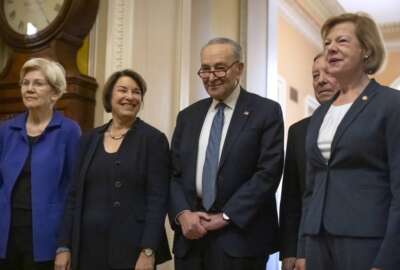Contribution limit changes coming to the Thrift Savings Plan in 2025
Participants ages 50 and up can make additional catch-up contributions of $7,500. Those ages 60 to 63 can make even higher catch-up contributions.
- The Thrift Savings Plan board is reminding participants about changes to contribution limits coming for 2025. Generally, TSP participants will be able to contribute a maximum of $23,500 to their accounts next year. But participants ages 50 and up can make additional catch-up contributions of 7,500. Those aged 60 to 63 can make even higher catch-up contributions of $11,250 due to the Secure 2.0 Act. As of December, there are 7.2 million accounts in the TSP, a new record high. About 155,000 of those accounts are TSP millionaires.(TSP December board meeting - Federal Retirement Thrift Investment Board)
- Sen. Roger Wicker’s new legislation sheds light on what the defense priorities might be for the next year. Wicker, who is poised to become the next leader of the Senate Armed Services Committee, already laid out his plans to bring billions of dollars in new military spending in his report released in the spring. The new legislation builds on the previous document and lays out his roadmap for reforming the acquisition bureaucracy and speeding up innovation within the Defense Department. To improve acquisition processes, the plan proposes repealing certain statutory provisions that “add reporting requirements, create unnecessary pilot programs, or micromanage the executive process.” (Incoming SASC leader lays out plans for defense acquisition reform - Federal News Network)
- Service members in about four dozen locations within the United States will see an increase in cost-of-living allowance rates starting in January, while service members in over 50 other areas will no longer receive the benefit. Cost-of-living allowance rates will range from $35 to $60 per month for service members with dependents and from $27 to $46 per month for members without dependents. The total amount of the cost-of-living allowance varies based on location, pay grade, years of service and dependency status. The cost-of-living allowance helps service members to offset additional expenses due to higher local prices. COLA rates change depending on the non-housing prices such as food and transportation in a duty location as compared to non-housing prices in an average continental U.S. location.(Some troops will see increase in cost-of-living allowance rates in 2025 - Department of Defense)
- A bill to boost Social Security benefits for public servants is heading to President Biden’s desk. The Social Security Fairness Act is expected to be signed into law after the Senate cleared the legislation just after midnight Saturday by a vote of 76-20. The House previously passed the bill in November. The bill repeals the Windfall Elimination Provision and Government Pension Offset, two provisions of Social Security that reduce or sometimes eliminate benefits for certain federal retirees and other public servants, as well as their surviving spouses. Over the years, the bill has gained bipartisan support and the backing of many organizations. The legislation has gained criticism as well. Some have argued that it would have negative impacts on Social Security’s solvency, and have called for reforms rather than a full repeal of WEP and GPO. In total, WEP and GPO impact close to three million individuals.(Senate passes Social Security bill to repeal WEP and GPO - Federal News Network)
- The Office of Management and Budget will be appointing a senior official to lead and coordinate the delivery of services to the public from a governmentwide perspective. With the Senate's approval of the Government Service Delivery Improvement Act early Saturday morning, OMB will name someone to focus on creating delivery standards, policies and guidelines for services. This person will help agencies assess and improve service delivery processes, use customer feedback and consider how to improve other factors like transparency and burden reduction for citizens. Additionally, agencies also have a year to name a senior official to oversee service delivery. The House passed the bill in May. It now goes to President Joe Biden to be signed into law.
- The Defense Counterintelligence and Security Agency is trying to get the next-generation background investigation program back on track. DCSA is moving out on a 36-month product roadmap for the National Background Investigation Services program. Pentagon leadership approved the new plan for NBIS this past fall. DCSA officials said they will start rolling out new capabilities, like the new Personnel Vetting Questionnaire, in 2025. The NBIS program is years behind schedule and well over budget. But DCSA said under its new plan, NBIS will fully replace legacy background investigation systems by the end of fiscal 2027. (DCSA details new plan for next-gen background investigation system - Federal News Network )
- The Army's CIO continues his overhaul of IT policies. The Army has updated processes to certify both software development platforms and pipelines. The service also has new criteria and a process to enable a continuous authority to operate. Army CIO Leo Garciga detailed these and other new policies as part of its continued implementation of its software modernization initiative. Of the five new policies Garciga signed off on last Thursday, the move to a continuous ATO lets commands and offices move to more real-time security oversight. Another memo describes a new approach to configuration management for DevSecOps pipelines and plaforms. Since Gargica became CIO in July 2023, he has updated 35 policies. (Army CIO sets new policies for software development - U.S. Army)
- A familiar face is taking over as the intelligence community’s top IT official. Doug Cossa has been named acting chief information officer for the IC. He replaces Adele Merritt, who was recently named CIO for the National Institutes of Health. Cossa had been serving as CIO at the Defense Intelligence Agency since July 2021. During his time as DIA CIO, he spearheaded efforts to modernize the Joint Worldwide Intelligence Communication System. As the IC’s lead CIO, Cossa will be in charge of enabling and integrating key technology efforts like cloud migration and artificial intelligence. (Doug Cossa LinkedIn post - LinkedIn)
Copyright © 2024 Federal News Network. All rights reserved. This website is not intended for users located within the European Economic Area.
Michele Sandiford
Michele Sandiford is a digital editor at Federal News Network.






